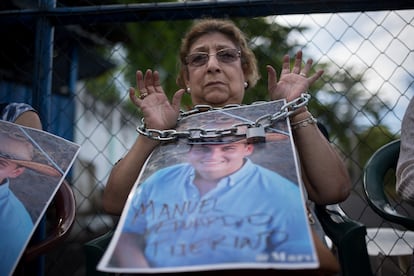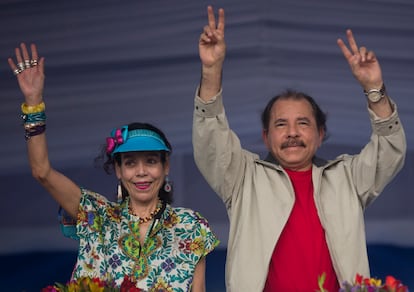Trials via video call, disappearances and disease: this is what political prisoners are subjected to in Nicaragua
The Legal Defense Unit (UDJ) – a local NGO – denounces the ‘coordinated action that reveals the instrumentalization of the state apparatus to repress’ prisoners for political reasons


The jailers at La Modelo prison in Managua, the capital of Nicaragua, took student leader Jasson Salazar out of his cell on August 8, 2023. They sat him down in front of a computer. On the screen, through a video call, was the image of Judge Ulisa Yahoska Tapia Silva, head of the 13th Criminal Court of Managua. A “Zoom trial” began in which the young man didn’t have a defense lawyer who understood the charges. In the same session he was found guilty of the crime of “undermining national integrity and spreading fake news.”
Salazar is one of the more than 100 political prisoners being held in Nicaraguan prisons by the regime of Daniel Ortega and Rosario Murillo. The number was higher until just a little while ago, but this past January 14, Bishop Rolando Álvarez and 17 other Catholic clerics were taken from their cells and exiled to Rome.
The student leader’s trial illustrates one of the new arbitrary practices of the Nicaraguan justice system, which is controlled by the Sandinista National Liberation Front (FSLN), the ruling party. Nowadays, political prisoners aren’t even taken to a court to be tried: instead, they’re declared guilty through video calls. Lawyers also cannot know the file numbers or charges, so it’s impossible to formulate any viable defense.
The Legal Defense Unit (UDJ), an organization that monitors the judicial processes of political prisoners in Nicaragua, catalogs virtual trials as a new repressive measure being used by the regime. But this isn’t the only new pattern detected between August of 2023 and January of 2024. According to a report from the UDJ, various repressive methods reveal “the instrumentalization of the state apparatus to repress [political prisoners] in Nicaragua.”
“Over the last six months, we’ve identified the following repressive patterns in the arbitrary detentions perpetrated by the state of Nicaragua: illegal raids, forced disappearances against people considered to be opponents or critics of state party politics, as well as trials being held via video call. [We have also observed] coordination between the penitentiary system and the police during interrogations, as well as the dire prison conditions, which include infestations of bedbugs,” the report summarizes.

The arrests
The chain of arbitrariness begins with the arrests of opponents. In these cases, anguish is felt by family members, such as those of Freddy Quezada, a retired professor who was arrested on January 29, 2023 for making critical comments against the regime on social media. The arrest of the former university professor was coordinated by civilians, who oversaw three police officers. Since his arrest more than a year ago, his family has no knowledge of his whereabouts.
Adriana Quezada, the professor’s daughter, tells EL PAÍS that, initially, they heard that he was transferred to District III, a notorious police station in Managua. However, the final whereabouts of the teacher haven’t been revealed by the authorities. “As a family, we’ve been in and out of El Chipote prison and La Modelo, and we still don’t know anything. They don’t tell us anything,” the woman laments from Panama, where she now resides.
This story is common among the relatives of political prisoners. It’s another repressive pattern — one of the more serious ones — that the UDJ includes in its report: “All information is denied to the relatives of political detainees and their defense lawyers, including verification of their whereabouts. This practice implies that a state policy of forced disappearance is being imposed, due to deliberate concealment of [prisoners’] whereabouts.”
The organization denounces a “worsening” of short and medium-term forced disappearances, citing the case of Brooklyn Rivera, an Indigenous representative and former FSLN ally, and the young poet Carlos Bojorge.
“In these cases, the authorities have refused to provide information about their reliable whereabouts… there’s no certainty about their conditions of detention, nor confirmation about their state of health [or whether they’re even alive]. It has been [confirmed] that prison authorities recommend that relatives look for political detainees ‘in the morgues,’ increasing their anxiety, which constitutes another type of torture,” the UDJ document states. The NGO also highlights that the judiciary rejects the legal right of political prisoners to apply for habeas corpus.
Another repressive measure is that, when opponents are detained, they’re immediately transferred to the jurisdiction of the National Penitentiary System, without any formal charges being filed against them, as required by law in Nicaragua. “Detainees are now interrogated and tortured within the penitentiary system, unlike in previously reported patterns, in which the police were the ones who carried out these repressive acts. Currently, coordinated participation has been identified between interrogators from the [National] Penitentiary System and agents from the National Police,” the UDJ notes.
Deplorable conditions in cells
The report presented by the lawyers’ organization on February 15 also states that cruel and inhuman treatment against political prisoners persists in the regime’s prisons. Political prisoners are given spoiled food and don’t have access to adequate medication for their chronic illnesses. Meanwhile, their families are harassed during visits, if they’re allowed to visit at all.
“In addition,” the UDJ adds, “we have [received reports] about the presence of infestations of [bed bugs] in different prisons across the country where political prisoners are being held. Several political prisoners have skin conditions, such as black welts and rashes that cause constant itching and burning. More security cameras have also been placed inside the galleries or maximum security cells, for permanent surveillance of people detained for political reasons.”
Adriana Quezada says that the anguish of not knowing where her father is or how he’s doing torments her entire family. They want to be able to bring him clothes, food and his diabetes medications. “The world has been turned upside down, because people who commit real crimes — that is, common prisoners — have all those [basic] benefits. Their families know where they are. But my dad, who has been a professor all his life and is now a political prisoner, isn’t allowed anything at all. Not even a book. And that, I’m sure, is what must hurt my dad the most. He’s had a book at his side to read all his life, because he’s a philosopher, a professor, a reader.”
Sign up for our weekly newsletter to get more English-language news coverage from EL PAÍS USA Edition
Tu suscripción se está usando en otro dispositivo
¿Quieres añadir otro usuario a tu suscripción?
Si continúas leyendo en este dispositivo, no se podrá leer en el otro.
FlechaTu suscripción se está usando en otro dispositivo y solo puedes acceder a EL PAÍS desde un dispositivo a la vez.
Si quieres compartir tu cuenta, cambia tu suscripción a la modalidad Premium, así podrás añadir otro usuario. Cada uno accederá con su propia cuenta de email, lo que os permitirá personalizar vuestra experiencia en EL PAÍS.
¿Tienes una suscripción de empresa? Accede aquí para contratar más cuentas.
En el caso de no saber quién está usando tu cuenta, te recomendamos cambiar tu contraseña aquí.
Si decides continuar compartiendo tu cuenta, este mensaje se mostrará en tu dispositivo y en el de la otra persona que está usando tu cuenta de forma indefinida, afectando a tu experiencia de lectura. Puedes consultar aquí los términos y condiciones de la suscripción digital.








































